
http://www.kindamuzik.net
ernaast
Onze laatste liverecensie.
Onze laatste albumrecensie.
Ons laatste interview.
Onze laatste video.
Gonzales
Hip hop meister to the thinking masses, Gonzales is a one-man barrage, a roadblock, a provocateur majeur, and a smack in the face of good taste. Groucho Marx, Canada, your own smell, and Berlin? What makes this musical supervillain tick? And more importantly: Is Chilly Gonzo for real?
Tekst: Alex Tobin
Publicatiedatum: 23 april 2002
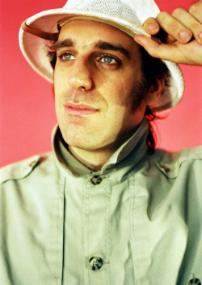 You claim to have discovered music through comic books, explaining also that there were many
superheroes in music, but no supervillains. How is your quest going to become the first true music
supervillain?
You claim to have discovered music through comic books, explaining also that there were many
superheroes in music, but no supervillains. How is your quest going to become the first true music
supervillain?
"Well, last night it was quite a supervillainous performance, to say the least. Somehow I
started to answer questions quite seriously, but people were laughing with the rhythm of a stand-up
comedy act. Sometimes in those moments, when there's such a big surprise from the audience, this can
really bring out the real supervillain. In these kinds of spontaneous moments the audience can
somehow also tell that I'm surprised by it, and then you have a chance for something transcendent.
An entertainer's show - at least a large percentage of them - are showing off, doing something
that's tried and true that you've done in routines. The Marx Brothers worked on their routines for
years and years and years, and they still did them as if they were old jazz songs. I have those
moments too, but when you really get something new it's great. Last night was great, very
supervillainous indeed."
Isn't it sort of frustrating at times, when you're actually trying to say something serious? Or
is that actually a compliment of sorts, that people don't take you seriously?
"Well, if it were a puppet or a cartoon character it would be a great scene, right? If he
comes in and he goes: 'Well, I don't understand musicians who say they're just doing it for fun. Do
you know any dentists who just want to clean people's teeth for fun?' I'm like: 'Yeah, but do you?
Isn't it ridiculous actually that musicians get away with saying that and a dentist wouldn't?' I'm
saying something serious, but it's also pretty funny, if you think about a dentist who would say
that. Fucking hell, that would be funny!"
Does the level of your comedy and absurdity, combined with the feedback you receive from the
audience, differ from country to country?
"Sometimes, yeah. I think Germans' sense of humour is really underrated, for example. It's
obviously dangerous to stereotype in any way. I'm only really dealing with a certain kind of
audience, mostly young people who are in nightclubs and read magazines. I don't think I have a pulse
reading on the state of these nations. I have a pulse reading on the state of the underground nation
overall as it exists in Europe, I would say. I really like to play with it, because, as I've
started to realise, most of them - while addicted to it and while, in a way, looking for
something - they're starting to get the nagging suspicion that maybe it can't last forever, and 'how
come sometimes I don't really feel satisfied?' So if I can be a bridge... I'm not going to say that
I would encourage them actively, like: 'Stop reading this magazine now!' They should really keep it
in mind; keep it with a grain of salt. I would encourage everyone to maybe strengthen the bubble
around themselves, make it a bit stinkier with just their own smell. If you're making something or
if you have a superpower and you want to use it, maybe spend more time with yourself to figure out
what it is."
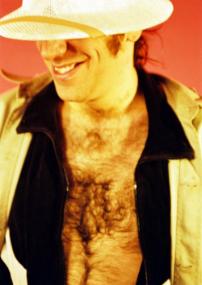 A sort of rebellion against the trend of uniformity...
A sort of rebellion against the trend of uniformity...
"Well, I don't think it's a trend. I think the uniformity comes from the musicians who are
asking each other: 'What're your top ten records, man?' Everyone ends up with more or less the same
kind of collection of stuff. These are like really recent influences, so I don't take them so
seriously. I'm thinking more in terms of getting back to: 'What was I hearing before I was even a
fan of music? What was in my house when I was growing up?' When you're a fan you're really looking
for something. You're not really open to influence at all. It's when you're five or six - before you
even know what being a fan is - that you're really getting it all in. I just think of all the
European music I heard that my dad played. He was kind of a eurosnob. He was playing cabaret music,
chanson, and this Broadway stuff. I think all that stuff is the real deep influence. Now, whether or
not I'm using a drum machine or a piano is not so relevant in the end, because I'm just trying to
somehow take those influences and turn them into something."
Is this also maybe way you're a self-proclaimed enemy of the "journalist music expert"?
"Somehow that got misunderstood in a previous interview. I really have no quarrel at all with
journalists. My quarrel is with the artists and the fans. I think the standard for the artists
should be higher. They should kind of admit that there are parts of the job that they're
underachieving on, usually not the music. On a musical level most of the ones who are serious and
that have been doing it for a while are probably sufficiently spending time learning about it.
That's cool. There are so many other parts of the job they seem to be underachieving on.
Eventually, I'd love to see more fans become artists. I had these transformations, and they were so
positive for me. I can't really be sure that they're right for everyone, but maybe that's what the
fan base really is. Maybe my music is for people who would sort of see the kind of transformation
that I could have had, from so-called 'musician' to so-called 'entertainer'. I think maybe some
people would be like: 'Yeah, that's cool. It's cool that this guy admits that he wants to be the
best at what he does, even if it's a really small thing.' I just want to be the best at it."
 Otherwise why bother?
Otherwise why bother?
"Yeah! That's why I called the album Presidential Suite. Don't be embarrassed of ambition;
don't be embarrassed of failure especially."
From what I've read you weren't exactly happy with the diversity that was going on in Canada. Did
moving to Europe act as a conductor or an accelerator for this transformation?
"I think so. I think moving any place would be. I wasn't happy with the youth culture. That was
clearly going to be where I was going to be doing my job. It is a really wonderful place for all
kinds of other reasons, but in this case I just kept on hearing what my father said: 'You can't get
a good cup of coffee in Canada.' I somehow always felt destined to go to Europe, because all of the
music I heard - all of these eurosnob subtleties - that was in my family."
So there was no rebellion against your father. In fact, you've become a eurosnob yourself.
"I would definitely say that I've joined the fold!"
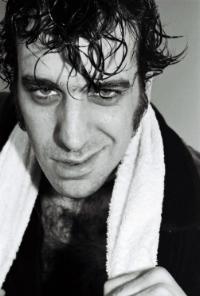 Is what you're doing now a sort of reaction to what was taking place in Canada, to your
surroundings?
Is what you're doing now a sort of reaction to what was taking place in Canada, to your
surroundings?
"When I was in Canada I was really the student of music, this guy who was asking: 'What's your
favourite record?' I'd also studied music in university and gotten a degree. I thought if I go over
the sea at least I'd have the faint illusion of a blank slate. Of course it's not as blank as you
think, and it gets filled up with pretty much the same shit in the end. That's just a great way to
get into character. Reset."
Was there a sense of European romanticism that you experienced, having grown up around all of
this inherited culture?
"Yeah, absolutely. I remember just looking at the records and looking at Serge Gainsbourg's
face and going: 'Whoa-ho! This guy makes this music?!!' It's so cool, what a cool illusion."
Your music collects a multitude of styles and stems from numerous diverse influences. How
important is being eclectic and completely free to experiment to you as an artist?
"I think I like to think more about the cartoon character aspect of it. This is what I like to
occupy my time with if I'm just kind of lackadaisically fantasising about Gonzales. I think the
music just follows that. The reason that this music has a baroque influence - this kind of shiny,
classic feel, this cabaret feel - is mostly because I'm feeling very presidential these days and
I'm feeling a little bit like I want to represent that. The music will always follow the character.
The Entertainist was much more a raw, tell-it-like-it-is Gonzales, basically an introduction to the
personality. Über Alles was much more straight music, and I remain mostly silent through the album.
The Entertainist is reflecting that Gonzales had become a media personality. I had no plan for that
when Über Alles came out. The British journalists started to write their first reviews, and I had
this album that was very soft. I'd just done this incredibly crazy, hardcore Andy Kaufman-style
show, and I was also confused on my own. Really... not a plan! That was the first time I had to
start doing a round of ten interviews in one day, and I just thought: 'OK, this is another part of
the job, and I have to figure out a way to do it.' Basically I made an album that was like the
answers to interviews. The Entertainist is like a press kit, and I made it with hard beats, really
quickly for people in Berlin. It was my arrival in Berlin somehow. How quickly things change!"
You're a wandering minstrel of sorts. You're more or less settled in Berlin at the moment, and
you also like to take in all sorts of different cultures, influences, and friendships throughout
Europe. Is the fast-paced and fluid lifestyle important to you?
"No, it's a necessary part of the job. I think when I was in Canada - when I was shocked by all
of these elements I hadn't thought of before - it really took me by surprise. You just have to play
tricks on yourself, so that you can find a way to do them and they're fun, or else you just stop.
There are people who just stop. They stop giving interviews. They just can't have fun doing it
anymore. Maybe that will be me..."
Is the scene in Berlin something that is still able to excite you?
"I'm not there enough to really be in contact. I have contact with those ex-Digital Hardcore
people that I've worked with, which is actually only Patric Catani and Bomb 20. I was working quite
closely with Patric Catani, who now produces the Puppet Masters, and they're also very close mates
of the Canadians. It's a very small bubble, and I still continue to work with the people I worked
with on The Entertainist. The scene doesn't much extend far beyond that. I think most people that I
just named are also doing this fast-paced, fluid lifestyle as well, so at this point it's just
meeting in really funny places and trying to record when we can. Chicks On Speed do live three doors
down from me, Erlend from Kings Of Convenience just moved to Berlin... One day when I walk out of
my flat with a French journalist and there's Chicks On Speed and Erlend, he's just thinking: 'Oh,
Gonzales must be in a scene with these people!' St. Thomas just moved here. I don't know him yet,
but I'm sure he moved in two floors above me! We'll start making an album together!"
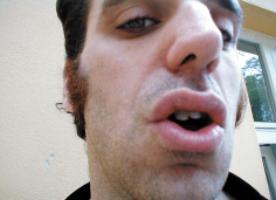 "If you talk to me after the show the gig is still going on." Is it your intent to play with the
media and audience's mind?
"If you talk to me after the show the gig is still going on." Is it your intent to play with the
media and audience's mind?
"Absolutely, just like an instrument. I can remember seeing this really great Sun Ra
documentary. What he's physically doing with the saxophone - Marshall Allen, I think - it's a really
virtuoso display with humour, just pushing the saxophone to its limit. I think that really applies
to the media and video as well. A slight of hand and a little bit of illusion. I think when you put
in something that's obviously really, really honest right next to something that's clearly fake,
this is a good illusion in 2002. It's not as easy as it was in the Forties or Fifties. Frank Sinatra
had a quite airtight illusion going, and maybe people in those days couldn't really imagine - they
were interested, but they might now know - what his life might be like. Now people have quite a
good idea of what these celebrities' lives are like. Mariah Carey, Whitney Houston... It's only
getting more and more. Now people are really sensitive to the backstory anyway. Of course you have
to confuse them with lots of really hardcore reality and lots of hardcore surreality. I think Andy
Kaufman is a good example of someone who was also playing with these same ideas. I look at what he
did and I think that it really applies even more today to the world of entertainers than it did when
he was alive."
How important is live performance to you, and what do you offer the audience what they don't get
on record?
"I guess that I just have a greater repertoire of ways to try to get people into the music.
That basically means being a classroom teacher and realising that some kids need to see things to
learn them, some kids need to write them down, some kids need to hear it, some kids don't want to
learn at all... In any Gonzales audience there's maybe one person who really had to see me in the
Face magazine sex issue or they would not buy my album. In that case I think it's totally valid,
just as valid as someone who is at the gig with their eyes closed, who is clearly there for the
music. There are all these different ways you have to try to get to people. I can do that much more
in a live situation. Some people need the personality; some people want to hate me before they'll
like me."
Do you ever get any violent reactions to your persona or your show?
"Yeah, I get some. I really do want to be loved and hated in equal amounts. I love to get an
extreme reaction. Sometimes it's come out, not to my physical danger yet... I think in most cases
it's a bit like a sex game. You want to be treated like shit maybe for a short time, because it's
someone you trust. If I play the piano at the beginning people go: 'Whoa! He is a musical genius,
actually! He wasn't kidding.' So, right away I have a bit of their trust, and then I can take it
somewhere else. Then they're maybe listening to a certain kind of rap and thinking: 'Well, he is a
piano virtuoso...' They might be more open to it. It's just like a sex game. You try to control the
parameters, and you tell the audience you're manipulating them, because that's my job. I tell them
I'm casting an illusion, try to get them to trust me, and hopefully they play along."
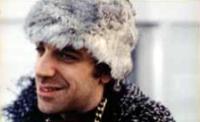 Are other forms of art such as film, literature, and visual art at all an influence on how you
conceptualise and what you do?
Are other forms of art such as film, literature, and visual art at all an influence on how you
conceptualise and what you do?
"Plenty of people. Groucho Marx. I really read a lot of biographies and autobiographies. I just
need many models in all kinds of fields: Klaus Kinski, a big inspiration is Leni Riefenstahl, Eric
von Stroheim... Those are sort of my big discoveries since I moved to Germany. Great illusionists,
one and all. I just respect any illusionists. Mohammed Ali is a big inspiration... Uri Geller,
Houdini... any mythmaker, any real mythological character."
http://www.kindamuzik.net/interview/gonzales/gonzales/1499/
Meer Gonzales op KindaMuzik: http://www.kindamuzik.net/artiest/gonzales








Deel dit artikel: